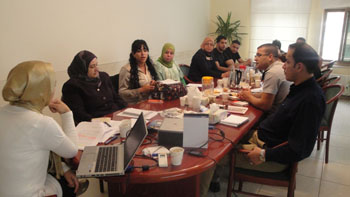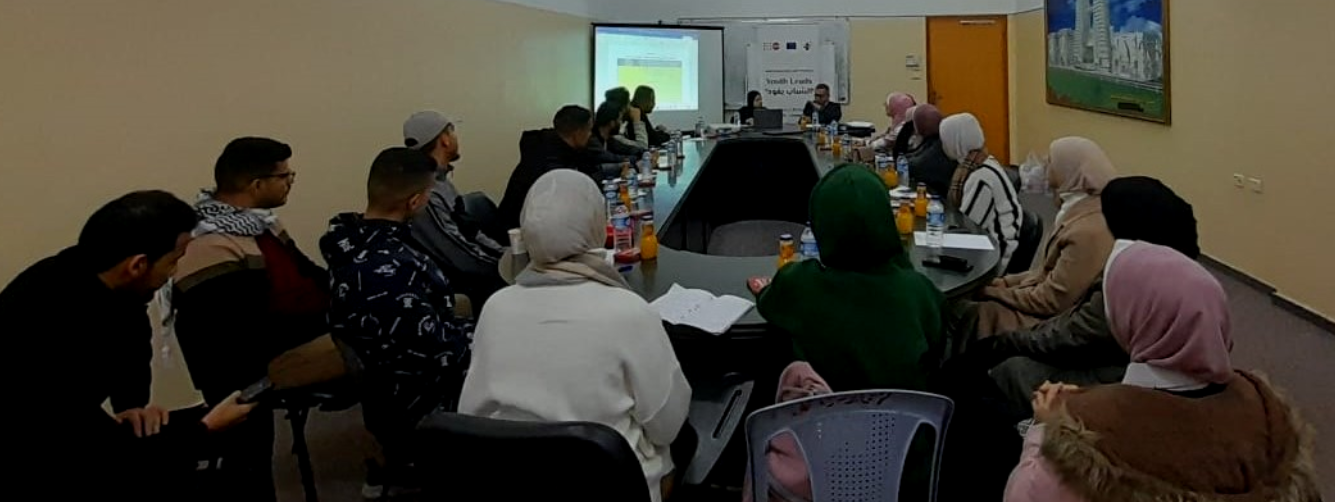
Ramallah – As part of the Oxfam-Novib-funded project “Towards institutionalizing UN Security Council Resolution I325 to achieve peace and security for Palestinian women” gender groups in Palestinian security services participated in a two-day workshop organized by MIFTAH. The workshop was an introduction to Resolution 1325 and its relation to the work of security services.
The workshop, which was conducted by attorneys Rawan Abu Farhat and Fadwa Dweib, had an apparent impact on the participants who appreciated the information on 1325 and the concept of its institutionalization. They also became aware of how this resolution is reflected on their work and their performance, especially since many are also trainers at their own workplaces.
Head of the gender unit in the Palestinian Police services Wafa’ Husseini said the workshop was very beneficial for everyone but especially for her. She said the workshop offered a good opportunity for both men and women working in the police services to benefit and learn from and illustrated how they could utilize the resolution in a way that serves the public, especially since the police is in daily contact with citizens.
Husseini, who said she has received similar training in Sweden and will soon travel to Jordan for the same purpose, maintained that such workshops will help to promote the process of gender integration and empowerment and to carry out projects to invest in the potentials of our young men and women in the police force.
Amneh Abu Ain, head of the gender unit in the preventive security forces, said the training left an important impact on her. She said it reaffirmed and deepened the knowledge she already had about Resolution 1325. Abu Ain was so affected she called for expanding this kind of training to the widest sector of society possible, including social worker unions, of which she is a member, and to women from displaced villages living in camps. “It is important that they know their rights.”
Wa’ad Ziyara works in the gender unit at the Palestinian Intelligence Services. She is a sociology and social services graduate but admits that before this workshop, she knew nothing about the UN resolution. The workshop has changed this completely. Ziyara now says she realizes that any resolution related to women , their rights and defense, will have a practical impact on her work.
While Ziyara says she always benefits from workshops she attends, MIFTAH’s workshop had added value because she learned that there are those who take advantage of women in exchange for this or that service. “But from now on, it will not be as easy for women to fall prey to this exploitation,” says Ziyara.
The workshop was catered to men as well. Diya’ Sabarneh from the Civil Defense services said he was very interested in getting more information on the subject, especially since he is also a trainer at his job.
“I didn’t know anything about this resolution,” Sabarneh admits, “even though I am a trainer and have participated in numerous workshops.” This is why he says the information they received was very necessary, hoping there will be more of the same in the future.
Preventive Security employee Haifa’ Abu Thaher said the training course will be reflected in her actual job on the ground, “especially since our society suffers from the occupation and oppression by the occupier.” She goes on to say that “change will not be confined to my work in the preventive security services, but also at home. This is what I realized through understanding 1325 and the changes it could make to some preconceptions about men and women and the relationship between them.”
Abu Thaher said she hoped future trainings would also include the heads of their institutions as well as individuals working in them, saying if the ‘head of the hierarchy” is targeted and influenced, this would have a positive impact on their subordinates.
Mohammed Jawabreh, gender coordinator in the police force in Hebron, who also trains in the gender unit and in the force, said: “Our duty is to protect women and to provide them with security and peace.” He went on to say that the training they received and the information they obtained about Resolution 1325 provides them with legal backing at their jobs. “We do our jobs and now know there is something that provides us with legal support; hence we carry out our duties without fear or hesitation.” Jawabreh is also a trainer and says MIFTAH’s workshop will definitely have a presence in future trainings he gives to his colleagues.
Attorney Fadwa Dweib, who is the executive director of the Beit Maqdis Company for law, studies and training and who carried out the training ,said the workshop was very advanced in terms of addressing such important subjects. One of these subjects was a general introduction to human rights and international humanitarian law, which she explained was a good way to address Security Council Resolution 1325 and understand the importance of its implementation in the Palestinian territories.
Dweib also said that while the targeted group was good, they were not decision-makers who are able to change policies. However, the group was very interactive with the discussions, she maintained, adding that a movie about the participation of women in peace-making after wars was shown to the group who discussed an analyzed the film afterwards.







